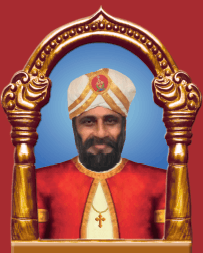Thachil Matthoo Tharakan
| Thachil Mar Mathoo Tharakan | |
|---|---|
 Thachil Mar Mathoo Tharakan | |
| Born | Alangad, North Paravur |
| Nationality | Indian |
Thachil Mar Matthoo Tharakan (1741–1814) played a key role in the history of Kerala/Travancore/Cochin in India towards the latter part of the 18th century and early 19th century.
Trader and exporter
Matthoo belonged to Alangad, near North Kuthiathode, in the present Paravur Taluk of Ernakulam District. He was born into a prosperous Syro-Malabar Christian family. He did business successfully, prospered, and the friends that he made during that period later took him to great heights. His powerful friends included Captain Eustachius De Lannoy, the Dutch commander who became head of the Travancore Army. Through such friends, he got introduced to the Kings of Travancore and Cochin. Matthoo Tharakan thus became a leading trader and influential Christian leader, from among the Indian Syriac-Rite Christians of Kerala.
The title Tharakan was granted by the King Dharma Raja of Travancore to indicate 'a noble trader'. Matthoo Tharakan was a merchant of timber, spices, salt, and tobacco, and was reportedly the first timber exporter from Southern India.
Matthoo Tharakan and Dewan Raja Kesavadas built up the Alappuzha port. He controlled the exports from Alappuzha and Cochin ports.
Minister of Travancore
Matthoo Tharakan was Commerce Minister to Maharaja Balarama Varma of Travancore. His best years were during the reign of Dharma Raja. He loaned a large sum of money to the Kingdom to help fight its wars against Tipu Sultan. However, during the following period of Jayanthan Sankaran Nampoothiri's Dewanship, there was an uprising and revolt engineered by Velu Thampi. This led to Velu Thampi becoming the Dalawa (Prime Minister) in 1801. Velu Thampi persecuted Mathu Tharakan (his ear was cut and later he was imprisoned). He ordered confiscation of Matthoo Tharakan's landholdings and assets alleging that he had to pay huge revenue arrears to the Government of Travancore. This order was later cancelled by the British Resident Macaulay. Balarama Varma repented the indiscriminate actions of Velu Thampi and symbolically gave Tharakan a golden ear. Velu Thampi's subsequent revolt against the British (without the sanction of the Maharaja) led to his suicide in 1809 in Mannadi Temple, Adoor.
Social and religious leader
Thachil Matthoo Tharakan made attempts at reunion of the Christian communities separated by the Coonan Cross Oath. But his efforts were apparently thwarted by the Portuguese. His efforts had the support of Mar Joseph Kariattil of the Indian Syriac-Rite Catholics, and of Mar Dionysius I of the Indian Syriac-Rite Orthodox faction, known as the Jacobites. But Bishop Kariattil's death in Goa and Rome's silence, ultimately led to the Indian Jacobites remaining separate and the Indian Syriac Catholic accepting the jurisdiction of the Latin Bishops in India. He was actively involved in organising the historic journey of Mar Joseph Kariattil and Paremmakkal Thoma Kathanar to Rome in 1782 for representing before the Pope the grievances of the Syriac Catholic.[1]
References
- ↑ Thachil Matthoo Tharakan Archived 1 March 2012 at the Wayback Machine.
Further reading
- M. O. Joseph, Nedumkunnam: Thachil Matthoo Tharakan, (Malayalam) Kottayam, NBS, 1962.
- Thachil Matthoo Tharakante Thankakompan (Malayalam) by K M Varghese, Manorama, Kottayam (1927)
- Thachil Matthoo Tharakante Suvarna Kamalam (Malayalam) by John Peter Thottam, Kalavilasini, Trivandrum (1933)
- Thachil Matthoo Tharakan by C. C. Lonappan Ookken (1966)
- Thachil Matthoo Tharakan
- Thachil Family Official Website